

Is Fashion a Credible Platform for Protest? Vivienne Westwood Red Label Spring/Summer 2015, Jean Paul Gaultier Spring/Summer 2015, Stella McCartney | Photo Collage: BoF LONDON, United Kingdom — Last week in Paris, Chanel appropriated the visual signifiers of feminist protest for its seasonal runway show.
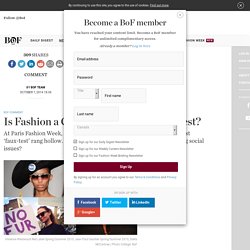
In a finale led by Karl Lagerfeld, a bevy of supermodels took to a catwalk christened “Boulevard Chanel” holding signs with slogans such as “History is Her Story,” “Make Fashion Not War,” and “Tweed Is Better Than Tweet.” On the same day in Hong Kong, a genuine protest was underway. Protesting for the right to democratically elect a candidate of their own choosing, tens of thousands of Hong Kongers formed crowds that throbbed and swelled in the city’s streets. What is Slow Fashion? When a new concept like Slow Fashion comes around it is often hard to describe it.
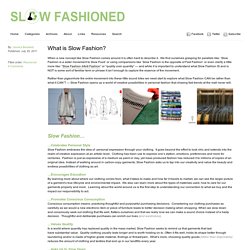
We find ourselves grasping for parallels like: ‘Slow Fashion is a sister movement to Slow Food’ or using comparisons like ‘Slow Fashion is the opposite of Fast Fashion’ or even clarify a little more like: “Slow Fashion ≠Anti Fashion” or “quality over quantity” — and while it is important to understand what Slow Fashion IS and is NOT is some sort of familiar term or phrase it isn’t enough to capture the essence of the movement. Rather than pigeonhole the entire movement into these little sound bites we need start to explore what Slow Fashion CAN be rather than what it CAN’T — Slow Fashion opens up a world of creative possibilities in personal fashion that chasing fast trends at the mall never will:
Topshop Gets Called Out For Unrealistic Mannequin Body Standards. By now, it seems as if most retailers have been involved in some sort of controversy.
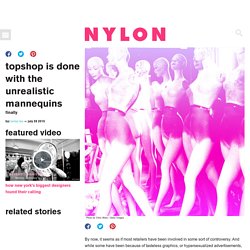
And while some have been because of tasteless graphics, or hypersexualized advertisements, one thing we continue to see over and over again—and frankly, we're tired of it—is the ridiculous body standards reinforced by the mannequins that model the clothing. Topshop, the popular British brand that boasts collaborations with stars like Gigi Hadid and Cara Delevingne, has come under fire after a shopper noticed that the store's mannequin had extremely thin legs. The mannequin was wearing the retailer's popular "Jamie" jeans, and the shopper, Laura Berry, voiced her concerns that the figure was not an accurate representation of the average female form. "Perhaps it's about time you became responsible for the impression you have on women and young girls and helped them feel good about themselves rather than impose these ridiculous standards," Berry wrote in a post on Topshop's Facebook page. From Chanel to Westwood, 5 times fashion week was about making a political statement.
Every fashion week, designers and brands from around the globe, from Kanye West to H&M, strive to put on a headline-generating show.
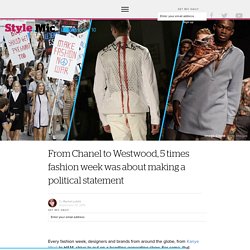
For some, that means having a model spin through the air, or projecting images right onto the models themselves. Designers have literally set stages on fire in hopes of getting people's attention. While some designers have used their platforms to shock or excite their audiences, other designers have used their platforms to start a conversation about the day's politics. Over the past few years in particular, designers have started to make fashion statements at their shows that meld with political statements, whether that means writing on a T-shirt or even unfurling a banner after a show. Fashion Show Review, Ready-to-Wear - Autumn 2016. MILAN, Italy — For all that it was a triumphant return to form, Miuccia Prada's menswear show in January turned out to be a mere appetiser for the deeper, richer women's collection she showed tonight.
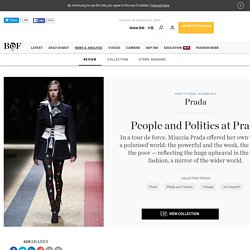
That was partly a reflection of her own feelings: "A woman is so much more complex than a man. She has to be a mother, a lover, a worker, a beauty... " Fashion’s most iconic political statements. As the date of the UK election draws nearer, politicians have turned their attention to fashion and pop culture in an attempt to wrest the youth vote.
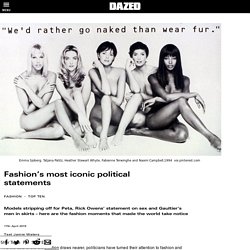
David Cameron has claimed Kardashian kinship, Nick Clegg has starred in an “Uptown Funk” election anthem, and the Labour Party has channelled Katharine Hamnett with their “Hell Yes” slogan tee. These recent antics come as no surprise – fashion and politics have long been linked. Fashion, Politics to Dedicate 2017 to Women - ASHARQ AL-AWSAT. Haute Couture Autumn Winter 2016-17 by Lebanese international fashion designer Elie Saab.
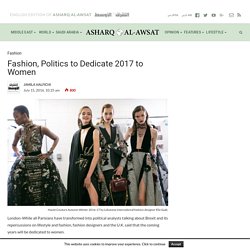
London-While all Parisians have transformed into political analysts talking about Brexit and its repercussions on lifestyle and fashion, fashion designers and the U.K. said that the coming years will be dedicated to women. Britain has made its decision and appointed a woman, “Theresa May,” as a prime minister for the first time since Thatcher. Political Movements in Fashion. Can fashion have a political conscience?
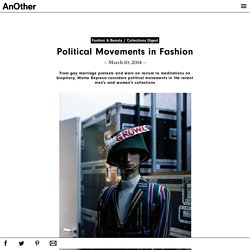
The question is a recurring one, and the answers are all too often clichéd. Examples of the industry’s insensitivity and lack of sympathy (or knowledge) towards social and political realities surface regularly in the media, and stories about blackface editorials and articles praising the “beauty” and “philanthropy” of the wives of Middle East dictators make the movie Zoolander look like a realistic take on the fashion world.
However (and contrary to popular belief) fashion is just as often used as a social commentary. When, in 1906, Paul Poiret freed women from the corset, the couturier was immediately hailed as a pioneer of the Women’s Liberation Movement. From Mainbocher to Yohji Yamamoto, designers have used their collections as outlets for socio-political commentary, and today’s talents are no exception. Debate: Does Fashion Have A Place In Politics?